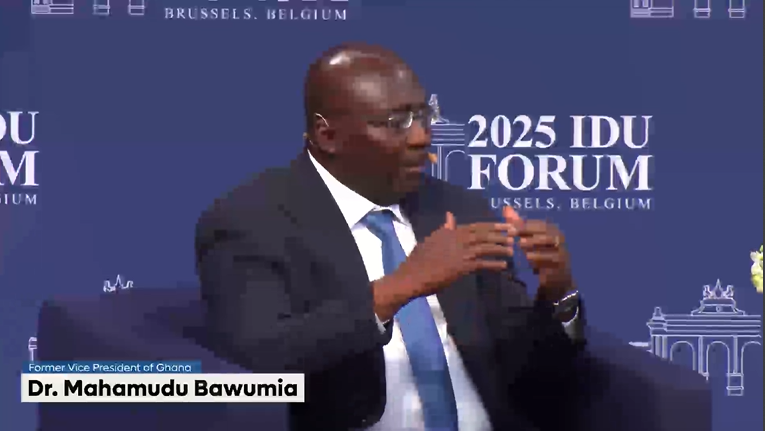Former Vice President of Ghana, Dr Mahamudu Bawumia, has delivered a critical message to global policymakers, asserting that the future of international trade hinges not on tariffs or protectionist policies but on trust and strategic diplomacy.
Speaking at the International Democrat Union (IDU) Forum, Dr Bawumia painted a sobering picture of the current state of global trade, warning that the proliferation of tariffs and other economic barriers is eroding the cooperative spirit that underpins sustainable global commerce.
According to Dr Bawumia, the post-World War II trade architecture—built on liberalisation, mutual benefit, and openness—is under serious threat.
He argued that many countries, faced with shifting geopolitical alignments and national security concerns, are increasingly turning to unilateral and often protectionist policies that distort markets and undermine economic fairness.
Citing historical precedents, Dr Bawumia maintained that tariffs, while often politically popular in the short term, have proven largely ineffective as long-term economic strategies.
He pointed to trade wars and escalating customs duties as examples of how these measures often spiral into retaliatory actions, leading to what he described as a “race to the lowest common denominator”—a situation in which global growth is sacrificed for political point-scoring.
However, Dr Bawumia reserved his most pointed critique for what he called the “trust deficit” that now defines international trade. He noted that the global landscape has become increasingly defined by suspicion and strategic rivalry, particularly among the world’s major powers.
He identified growing mistrust between Europe and Russia, the United States and China, and Australia and China as critical factors complicating trade negotiations and contributing to market instability.
“Today, the challenge is no longer simply about negotiating the best tariff deal,” Dr Bawumia said. “It’s about overcoming deep-seated geopolitical mistrust. When negotiations are carried out under the shadow of strategic suspicion, they are no longer purely economic—they are extensions of national security strategies.”
He likened the current global environment to the Cold War-era doctrine of “mutually assured destruction”, except that in today’s context, the threat is not nuclear war but “mutually assured suspicions”. This, he explained, is causing countries to withhold economic cooperation for fear that interdependence could be weaponised in future conflicts.
Dr Bawumia emphasised that this dynamic is particularly dangerous for smaller and developing economies, which are caught in the crossfire of superpower rivalries. These nations often lack the leverage to protect their own interests in a system dominated by trust-deficient giants, making them more vulnerable to economic shocks and policy spillovers.
To counter this trend, he urged global leaders to prioritise confidence-building measures—both economic and diplomatic—that can lay the foundation for sustainable trade partnerships. He proposed a recalibration of international institutions like the World Trade Organisation (WTO), which he said should play a more proactive role in mediating not just trade disputes but the underlying political tensions that give rise to them.
“Trust must become the cornerstone of trade in the 21st century,” he declared. “Otherwise, every trade agreement will be shallow, transactional, and ultimately unsustainable.”
Dr Bawumia’s remarks have already sparked discussions among policy analysts and trade experts, many of whom agree that geopolitical tensions are increasingly dictating economic policy. His intervention comes at a time when the global economy is grappling with disrupted supply chains, inflationary pressures, and the aftermath of multiple global crises—including the COVID-19 pandemic and the war in Ukraine.
Click the link Puretvonline.com | WhatsApp Channel to join the whatsapp channel
GOT A STORY?
Contact/WhatsApp: +233243201960 or Email: manuelnkansah33@gmail.com

